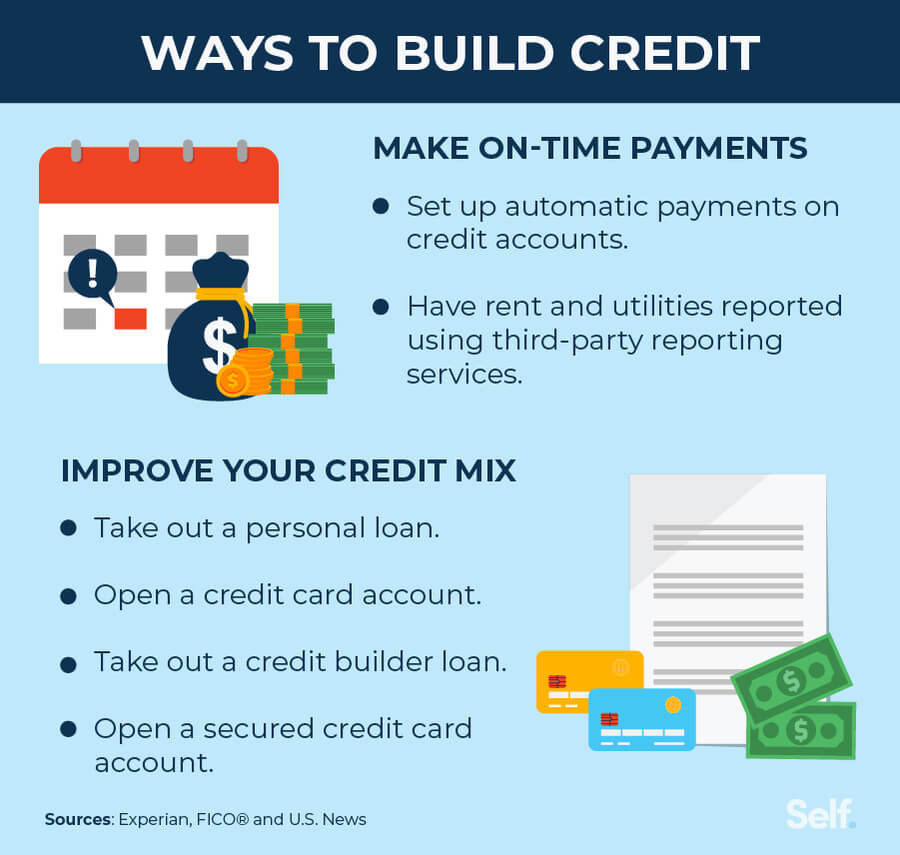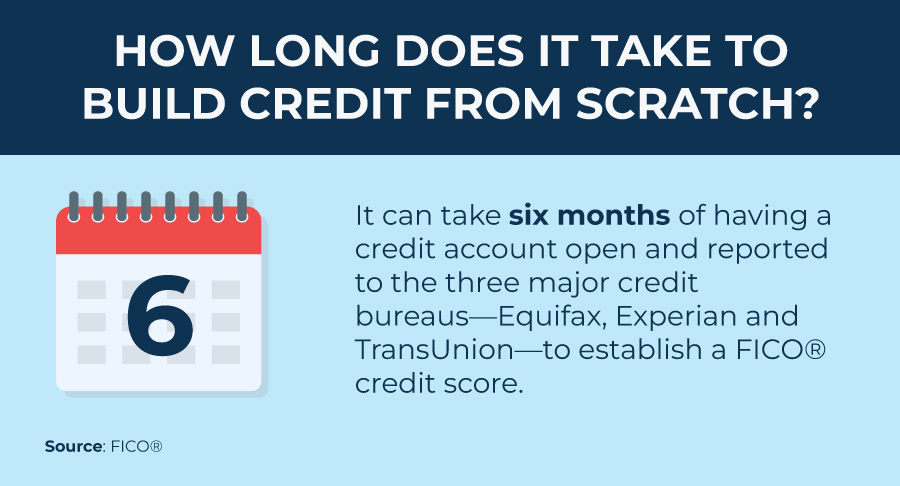How Quickly Can You Truly Build Great Credit
Building a good credit score might sound intimidating. However, if you’re starting from scratch and don’t have access to credit, you have options, such as credit builder loans and reporting utility and rent payments. The best part: You can start building your credit right away.
In this guide, we explain some of the best ways to build credit, how your credit score is calculated, and how long it will take to build credit.

1. Take out a credit builder loan
If you haven’t been able to qualify for loans through traditional banks or credit unions, a credit builder loan might be a good option, especially if you have poor credit or no credit. Taking out a credit builder loan helps you to build credit history and savings.
In a traditional installment loan, you get your lump sum proceeds up front and pay it back in monthly installments. When you obtain a credit builder loan, you make your monthly payments, which are put into a certificate of deposit (CD) or savings account, and once all of your payments are made, you get your lump sum (minus interest and fees). In addition, each of your payments get reported to the credit bureaus.
For example, Self’s Credit Builder Account offers you a way to simultaneously build credit history and savings. It’s a loan in a bank-held certificate of deposit (CD) that you pay off in monthly installments. Each monthly payment is reported to all three credit bureaus. At the end of the period, you receive the money back, minus interest and fees.
2. Sign up for a secured credit card
A secured credit card may help you build credit. After you apply and are approved, you just put down a security deposit, which acts as your credit limit, and then you can use the card to make charges up to the amount you deposited. However, the deposit doesn’t pay your balance. To use your card responsibly, pay attention to your bill’s due date, make on-time payments, pay more than the minimum payment and keep a low credit utilization ratio (CUR).
Your CUR refers to your total revolving debt divided by your total revolving credit limits, and experts suggest maintaining a credit utilization ratio below 30%. However, they add that staying close to 10% offers the best chance at adding a positive impact to your credit score. You should also make sure the lender will report your payments to the three major credit reporting agencies, which will impact your credit score with each bureau.
One secured card option, the secured Self Visa® credit card requires both an active Credit Builder Account (CBA) as well as certain eligibility criteria. After three monthly on-time payments to your CBA, an account in good standing, and a savings progress of $100 or more, you can use your savings progress as a security deposit and order your card. (These requirements are subject to change.) Self’s secured card allows you to set your credit limit using your available CBA progress and monitor your spending activity.
3. Set up automatic payments to make on-time payments
Automatic payments are scheduled recurring payments that ensure a payment is made, even if you forget. Using autopay prevents unnecessary missed payments from happening and ensures those on-time payments could continue to help your credit score over time. On-time payments are the largest part of your credit score calculation, accounting for 35% of your FICO® score, making on-time payments is an essential task for building credit. One caveat: Make sure you have enough funds in your bank account when the payment is scheduled, or it may be declined or create an overdraft situation.
4. Have your rent and utility payments reported
Another option that can help to build your credit is having rent and utility payments reported to the credit bureaus. If you pay your monthly rent and utility bills in full and on time, having them reported to the credit bureaus may impact your credit score in a positive way.
If you sign up for a rent reporting service like Self, your payments get reported to the credit bureaus, which can be factored into certain FICO® and VantageScore® credit scoring models. Keep in mind that while rent reporting impacts FICO® 9 and 10 scores as well as VantageScore®, these models aren’t the most commonly used. However, adding your rental history to your credit report may help if you’re seeking credit from a financial institution that relies on these models.
Self-reports your rent to all three bureaus with signup. If you have an active subscription and meet certain eligibility requirements, you can also pay a one-time fee of $49.95 to have up to two years of past rental history reported.
You can report in the same way for utilities, using a service like Self. Your payment history is the most important credit score factor, so making on-time payments and getting them reported helps to build a positive credit history.
5. Ask to become an authorized user
You may be able to piggyback off of someone else’s credit account by becoming an authorized user. However, not all credit card companies report authorized users to the credit bureaus, so make sure to check the lender’s policy first.
If they do report authorized users see if a trusted individual, such as a family member, agrees to add you to their account. When looking for someone to add you as an authorized user, be sure that person pays the account as agreed, has had the account open for a while and maintains a low credit utilization ratio (CUR; the total revolving debt on the account divided by their credit limit). If so, the individual’s good credit habits may positively impact your credit score.
Keep in mind that this can conversely hurt your score. If you become an authorized user on an account that has a negative payment history or high CUR, this impacts your score as well, and an account that has only been opened for a short period of time may have little effect.
6. Consider taking out a personal loan
A personal loan shouldn’t be taken out simply to help you build credit. However, if you have a costly expense or need to pay off high interest debt, you may want to consider one.
If you qualify for a personal loan, it can help you build credit in several ways. For one thing, it helps with your credit mix, which is a factor that affects credit scores and shows lenders how well you handle different types of credit. It also allows you to build up a positive payment history — provided you pay on time. Make sure to weigh the pros and cons and shop around for the best interest rate.
7. Review your credit report for any inaccuracies
Improving your credit score could be as simple as fixing inaccuracies on your credit report. It’s not uncommon for there to be at least one error on your report, and that error could be unnecessarily dragging down your credit score. So be sure to check your report. You are entitled to a free credit report from each bureau every year at AnnualCreditReport.com, and you can also receive a report by contacting the bureaus directly, although you may pay a small fee (no more than $13.50) for each report (Equifax, Experian and Transunion).
Here are some common inaccuracies you may find if you check your report:
- Incorrect accounts from identity theft
- Closed accounts still reported as open
- Same debt listed multiple times
- Incorrect payment or delinquency dates
- Accounts with incorrect balance or credit limit
If you do spot a mistake, you can dispute the error or inaccuracy with each credit reporting company in writing. The Consumer Financial Protection Bureau (CFPB) provides guidance on the ways to dispute an error on your credit report.
How is my credit score calculated?
More than 90% of top lenders use FICO® scores. Here is how it is calculated:
- Payment history: Payment history refers to how you’ve paid your accounts over the length of your credit. This makes up 35% of your score, a factor that indicates that you can make payments on time.
- Amounts owed: This factor makes up 30% of your score, and generally refers to the amount of debt you’re carrying. However, your debt total isn’t as impactful as your credit utilization ratio (CUR; your total revolving debt divided by your total revolving credit limits). If you use a high percentage of available credit, it can negatively impact your score.
- Length of credit history: Another factor that impacts your score is how long you’ve had credit — holding accounts open over long periods of time can have a positive effect on your credit. This accounts for 15% of your score.
- Credit mix: Your score takes into account your mix of different types of credit accounts. This shows lenders you can manage multiple types of credit responsibly. This makes up 10% of your credit score.
- New credit: The final factor is new credit, which is the credit accounts you’ve opened recently. According to FICO®, opening too many accounts within a short timeframe corresponds to greater risk, especially for individuals with a shorter credit history. This is 10% of your score.

How long does it take to build credit?
It may seem overwhelming to build credit from the ground up, but the truth is it may take less time than you think. If you’re starting from scratch, it may take about six months after getting your first credit product to start seeing results.
Keep in mind that credit building from scratch may be faster than rebuilding bad credit, depending on the state of your personal finances — whether you were bankrupt or have delinquencies that brought down your score. Negative credit marks, such as late payments, bankruptcies and collections, can stay on your report for seven years, while a Chapter 7 bankruptcy can remain for 10 years.
The journey of a thousand miles begins with a step, so the best way to start building (or rebuilding) your credit is to start good credit habits today with some of the options listed above. Expect that this process will take time and patience.
Disclaimer: FICO is a registered trademark of Fair Issac Corporation in the United States and other countries.
Sources
- MyFICO. “How Do I Go About Building My Credit History?” https://www.myfico.com/credit-education/faq/improving-a-score/building-credit-history. Accessed August 2, 2022.
- MyFICO. “What is Payment History?” https://www.myfico.com/credit-education/credit-scores/payment-history. Accessed August 2, 2022.
- MyFICO. “What Should My Credit Utilization Ratio Be?” https://www.myfico.com/credit-education/blog/credit-utilization-be. Accessed November 15, 2022.
- U.S. News and World Report. “How Can You Get Credit for Paying Rent?” https://money.usnews.com/credit-cards/articles/how-can-you-get-credit-for-paying-rent. Accessed August 2, 2022.
- MyFICO. “How to Start Building Your Credit for Free,” https://www.myfico.com/credit-education/blog/building-credit-free. Accessed August 2, 2022.
- Experian. “How Does a Personal Loan Affect Your Credit Score?” https://www.experian.com/blogs/ask-experian/how-does-a-personal-loan-impact-your-credit. Accessed August 2, 2022.
- Equifax. “Why Should I Check my Credit Reports and Credit Scores?” https://www.equifax.com/personal/education/credit/report/why-check-your-credit-reports-and-credit-score. Accessed August 2, 2022.
- Consumer Financial Protection Bureau. “How do I dispute an error on my credit report?” https://www.consumerfinance.gov/ask-cfpb/how-do-i-dispute-an-error-on-my-credit-report-en-314/. Accessed December 9, 2022.
- MyFICO. “What is Amounts Owed?” https://www.myfico.com/credit-education/credit-scores/amount-of-debt. Accessed August 2, 2022.
- MyFICO. “What is the Length of Your Credit History?” https://www.myfico.com/credit-education/credit-scores/length-of-credit-history. Accessed August 2, 2022.
- MyFICO. “What Does Credit Mix Mean?” https://www.myfico.com/credit-education/credit-scores/credit-mix. Accessed August 2, 2022.
- MyFICO. “What’s in my FICO® Scores?” https://www.myfico.com/credit-education/whats-in-your-credit-score. Accessed August 2, 2022.
- Equifax. “How Long Does Information Stay on My Equifax Credit Report?” https://www.equifax.com/personal/education/credit/report/how-long-does-information-stay-on-credit-report. Accessed August 2, 2022.






I was just as enthralled by your work as you were. The visual display is refined, and the written content is of a high caliber. However, you seem anxious about the possibility of delivering something that could be perceived as questionable. I believe you’ll be able to rectify this situation in a timely manner.
Thanks, I have recently been looking for info about this subject for a while and yours is the greatest I have discovered so far. However, what in regards to the bottom line? Are you certain in regards to the supply?
Your blog is a breath of fresh air in the often stagnant world of online content. Your thoughtful analysis and insightful commentary never fail to leave a lasting impression. Thank you for sharing your wisdom with us.
“Simply extraordinary! ✨ Your in-depth analysis and crystal-clear explanations make this a must-read. The amount of valuable information you’ve packed in here is amazing.”